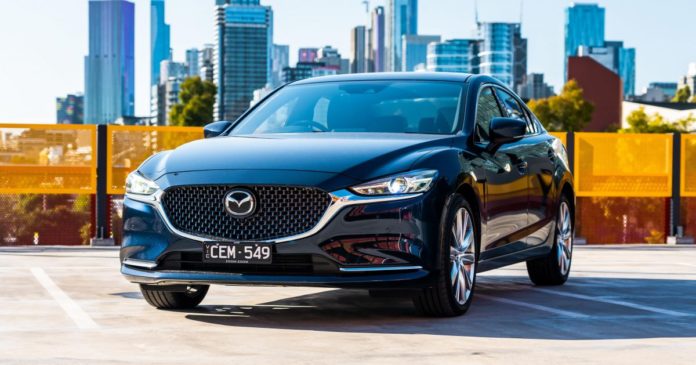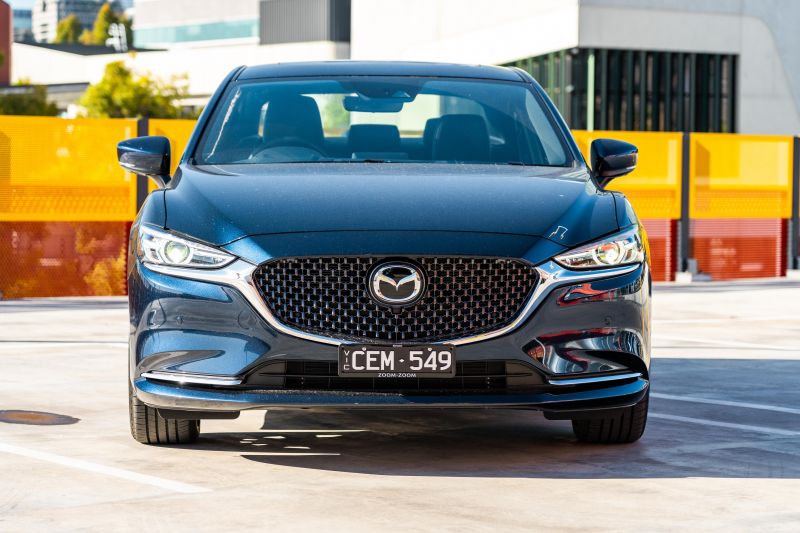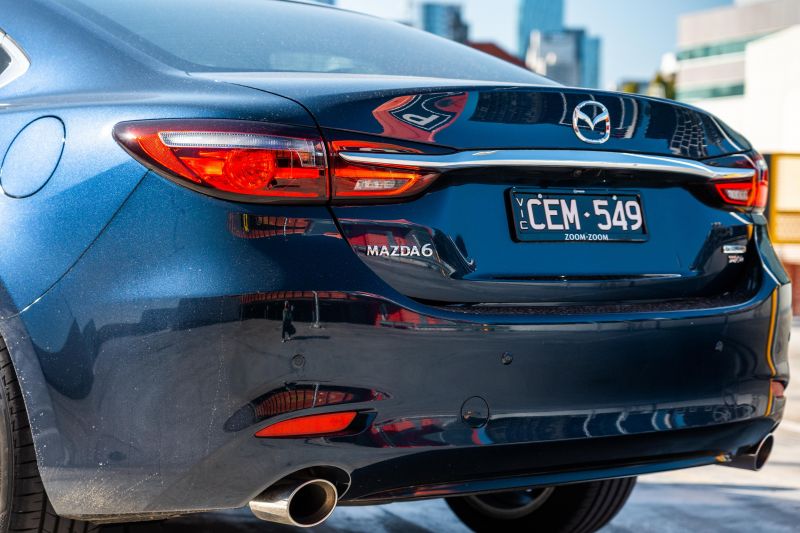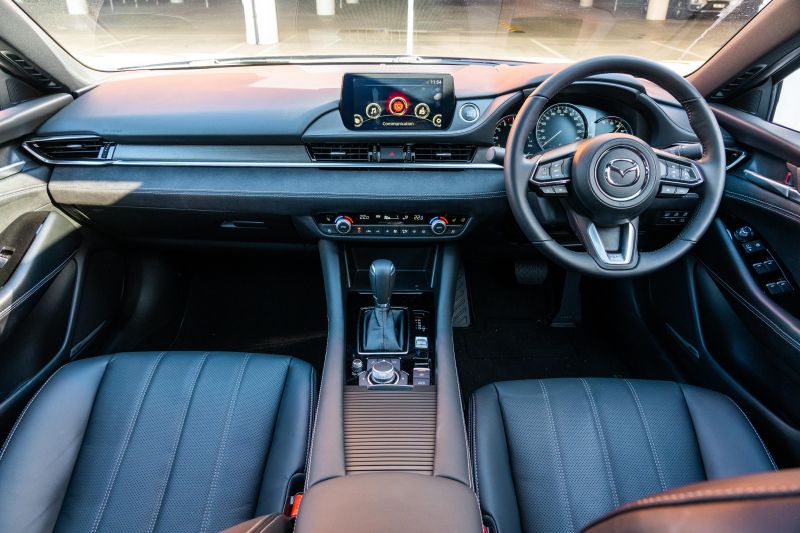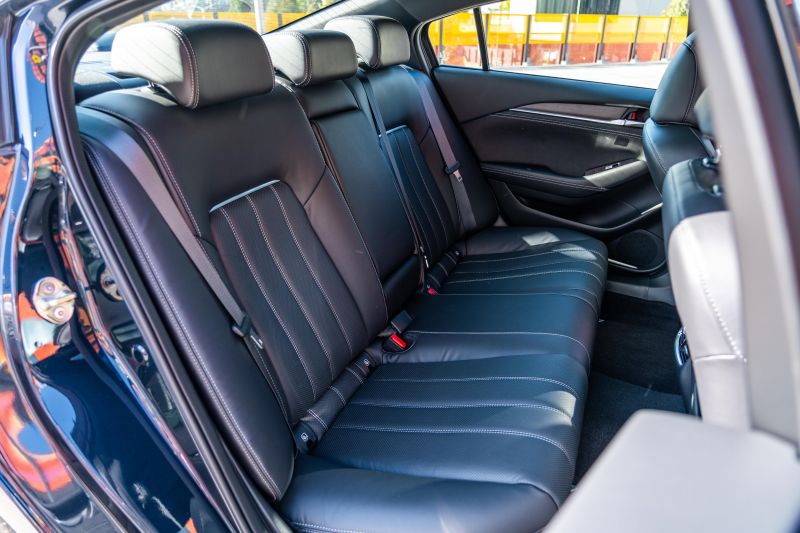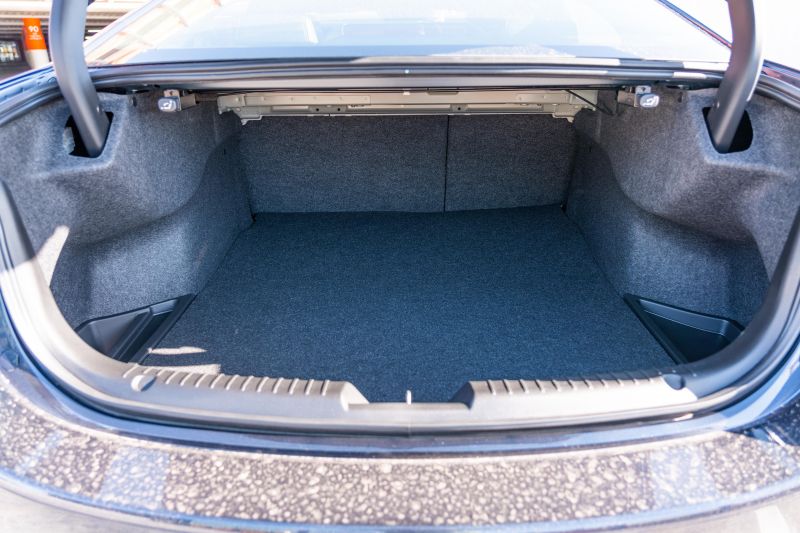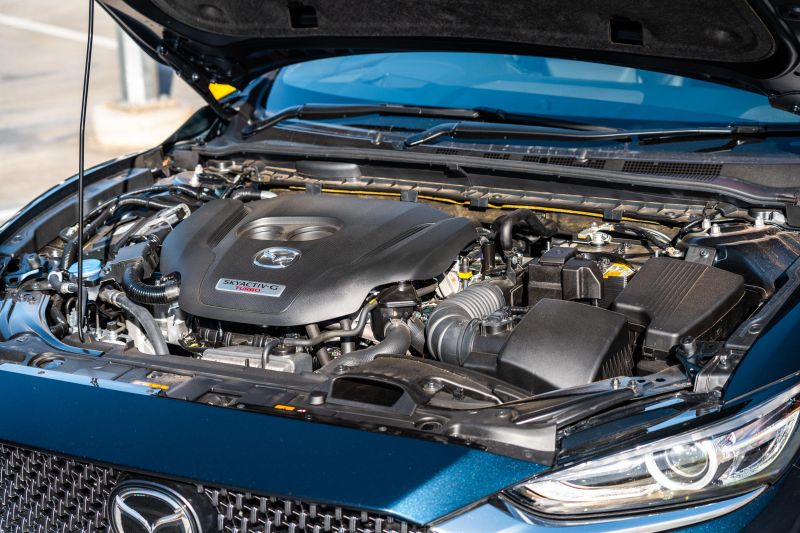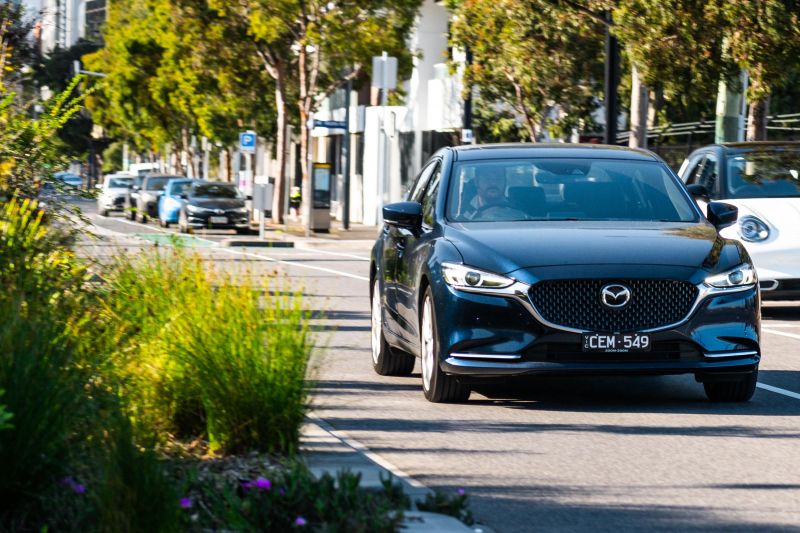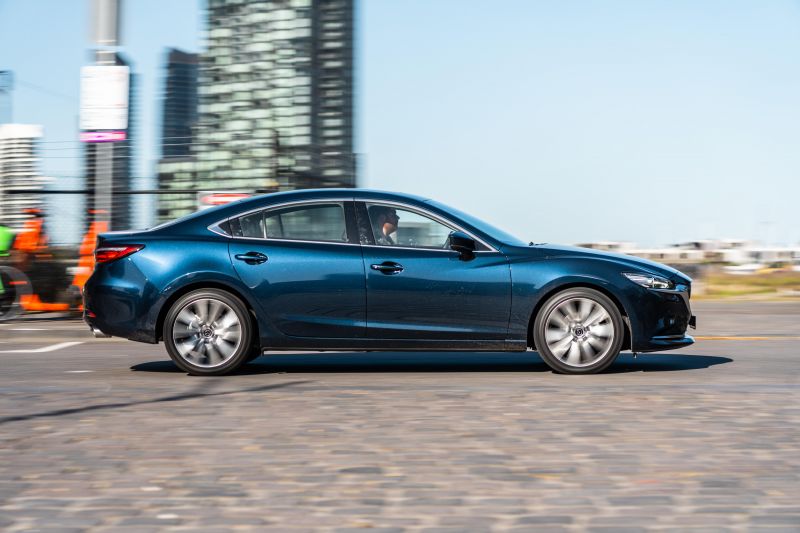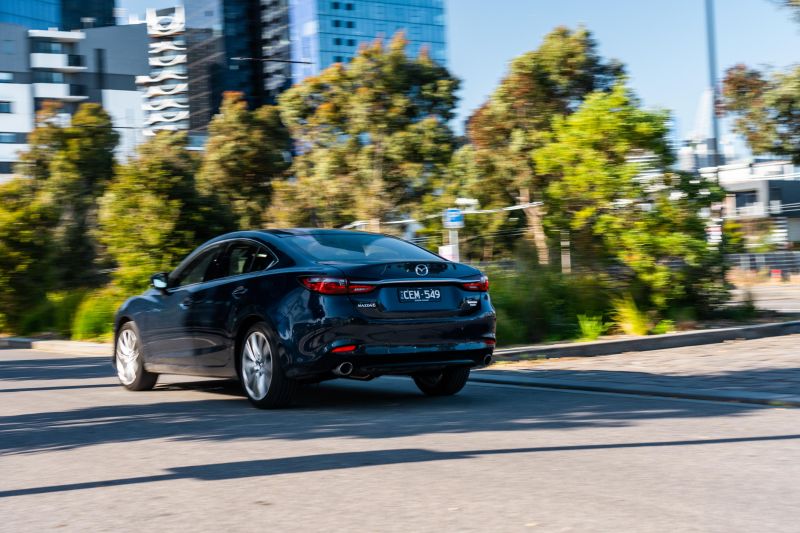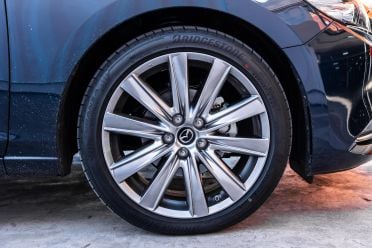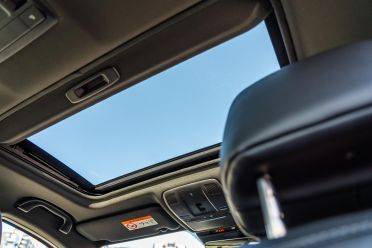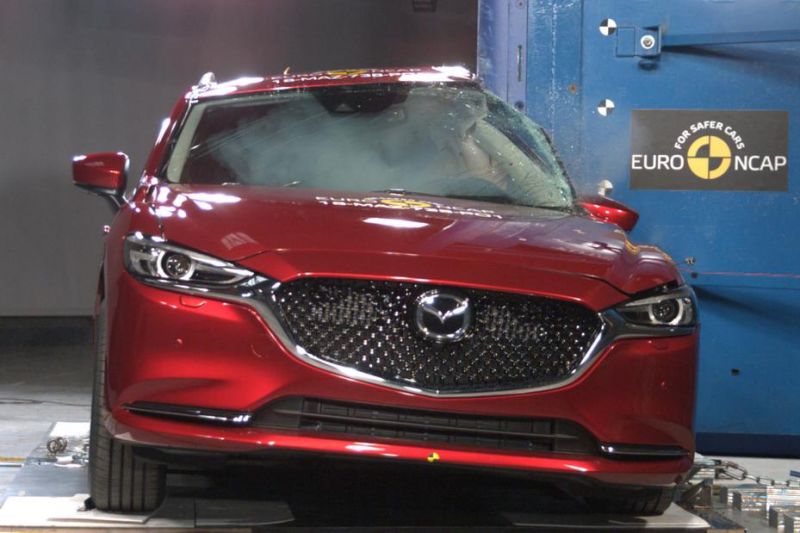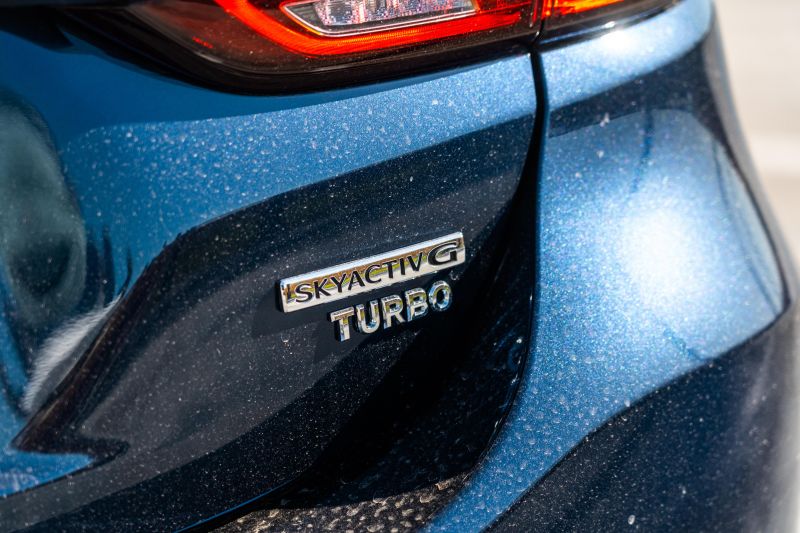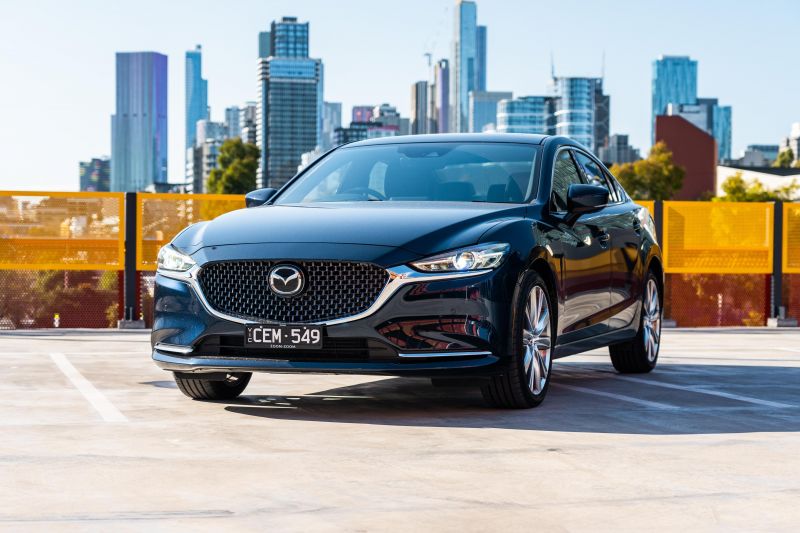The current-shape Mazda 6 Sedan and Wagon range dates back to November 2012, but the company sees life in its flagship passenger car still.
This latest round of updates launched earlier this year are the fifth applied during this generation, keeping it largely contemporary despite the march of time.
The fact the Mazda 6 remains such a handsome and good-to-drive offering indicates how excellent the model was at launch – an event now a speck in the rear-view mirror.
Additions for 2023 include engine tweaks, plusher trims, and wireless phone mirroring, while the latest driver-assist active safety systems have been progressively integrated with time.
How much does the Mazda 6 G35 Atenza cost?
The MY23 Mazda 6 range comes in sedan and wagon body styles and with the choice of two four-cylinder petrol engines – one turbocharged and one naturally-aspirated.
There are four core specification variants, plus a fifth ’20th Anniversary’ model available at launch.
The version we’re in here is the top-of-the-range Mazda 6 G35 Atenza Sedan, priced from $51,840 before on-road costs, equal to about $57,000 drive-away here in Victoria.
There are nowhere near as many mid-sized sedans to choose from now as there were back in 2012, which probably explains the Mazda’s enduring appeal – not everyone wants an SUV.
Some competitors still around at this price point include the Honda Accord VTi-LX ($57,900 drive-away), Hyundai Sonata N Line ($52,065), Skoda Octavia RS ($51,890), and Toyota Camry SL Hybrid ($48,490).
2023 Mazda 6 pricing:
Sedan
- G25 Sport: $35,540
- G25 Touring: $40,210
- G35 GT SP: $48,440
- G35 Atenza: $51,840
- 20th Anniversary: $53,635
Wagon
- G25 Sport: $36,840
- G25 Touring: $41,510
- G35 GT SP: $49,740
- G35 Atenza: $53,140
- 20th Anniversary: $54,935
MORE: 2023 Mazda 6 price and specs
What is the Mazda 6 G35 Atenza like on the inside?
Too often today we drive new luxury cars brimming with flash screens and haptic-feedback touchpads, so in some ways the Mazda 6’s much more traditional interior is a pleasant throwback.
Mazda has long tried to populate the middle ground between the Toyotas and the Audis of the world, and this cabin is very much case-in-point.
The use of wood and suede inlays, knee padding on the doors and centre tunnel, high-grade Nappa leather, and knurled metal for key touch points imparts the right sort of ‘vibe’ for a vehicle that professes to be a luxury sedan in all aspects bar the shape of its badge.
The driver’s seat moves electrically and has memory presets, as well as both heating and ventilation. Likewise the lovely leather-trimmed steering wheel has a heated rim function, which is very handy (pun unintentional) in Melbourne during June…
Behind the wheel – which has particularly logical banks of buttons on each rim – sits a 7.0-inch TFT instrument cluster with an analogue design style, augmented by a projecting head-up display (called an Active Driving Display) with digital speedometer.
The lower portion of centre fascia houses the climate controls, all operated by buttons and rotary dials, below which sits a scratch-prone piano black (not a fan) trim piece flanking the gear shifter and physical controllers for the multimedia system.
Behind this sits a pair of cupholders covered by a nice sliding cover, which complements the open shelf ahead of the shifter which comes with a wireless phone charging pad.
Now, to the major gripe I have with the interior: the multimedia system. On the one hand it offers wireless Apple CarPlay, satellite navigation, a 360-degree parking camera (with grainy resolution), and a really good 11-speaker sound system.
But it’s an older generation of software and hardware compared to the systems in other higher-end Mazda models, and both its menu design and its loading speeds are reflective of its age. It looks and feels a generation or two off the pace, because it is.
The screen itself is small, and when you’re driving doesn’t work via touch (neither do newer Mazda systems, it must be said). While the rotary controller and buttons on the centre tunnel are fairly easy to use for the most part, they aren’t great if you’re using phone mirroring.
Considering Mazda updated the infotainment in the similarly aged CX-5 to its latest in-house iteration, it’s strange the company didn’t do the same with the Mazda 6. It suggests a degree of cost cutting for a lower-priority model.
But if you aren’t the sort of person who minds having a sub-par infotainment display, the Mazda 6 otherwise remains a truly lovely place to spend time.
The back seats offer plenty of legroom even for my 194cm frame, and you have rear air vents and a pull-down centre armrest with both cupholders and two USB ports therein. However the headroom is borderline tight for taller folks, not helped by the fitment of a front-row sunroof.
The back seats split-fold downwards via levers in the boot for longer items, with said boot able to stow 474 litres. A space-saver spare wheel sits under the loading floor. For those who want more capability, the Mazda 6 Wagon is the better bet.
Mazda Australia says only 30 per cent of buyers of the current-generation model opt for this wagon body style. We say you are better-served being in this minority.
What’s under the bonnet?
Base models labelled ‘G25’ use a naturally-aspirated 2.5-litre four-cylinder petrol engine with outputs of 140kW and 252Nm, whereas flagship ‘G35’ versions get a turbocharged version with the same displacement making 173kW and 420Nm.
This latter engine gets an additional 3kW over the 2022 model’s 170kW power output, which Mazda puts down to “optimised engine control and turbocharger boost pressure”. The 420Nm torque figure is unchanged, but it was hardly lacking to start with…
Both engine options are paired to a six-speed automatic transmission with paddle shifters, and front-wheel drive is standard on all grades.
Mazda claims the G35 offers fuel consumption of 7.6 litres per 100km on the combined cycle, with 91 RON or E10 fuel.
How does the Mazda 6 G35 Atenza drive?
The 2.5-litre turbocharged engine offers a decent 173kW of power and a whopping great slab of torque – 420Nm at 2000rpm – for excellent tractability and punch when overtaking. It has a rich and raspy sound under heavy acceleration too, adding a degree of character.
Mazda claims the MY23 updates bring tweaks to the accelerator characteristics, engine control, and turbocharger boost, but without driving the pre-update vehicle back-to-back it’s hard to identify any meaningful improvements.
All Mazda 6 models are front-wheel drive, meaning hard standing starts in damp conditions will elicit axle tramping, but for the most part the chassis tames the engine. The six-speed automatic tends to be smooth and intuitive except for a bit of hesitation at low speeds.
There’s a small rocker switch near the gear stick which programs the transmission to hold lower gears for longer to bolster response out of corners. There are also paddle shifters if you want some manual control.
However, given the newest premium Mazda models use rear-wheel drive platforms and inline-six engines, the Mazda 6’s front-wheel drive layout and older four-cylinder engine looks less impressive. And unfortunately there’s no new RWD i6 Mazda 6 planned either…
While Mazda claims fuel consumption of 7.6 litres per 100km, we averaged 9.5L/100km. But on the positive side it’ll run on 91 RON or E10 fuel, rather than pricier premium 95 or 98 RON. There’s also a pretty smooth stop/start function which Mazda calls ‘i-Stop’.
One thing the Mazda 6 still excels at is its ride and handling balance, which manages to offer plenty of fun in corners but ample ride comfort and refinement at the same time.
The steering is well-weighted, the body control through corners is flat, and the recovery from undulations composed. Even with 19-inch wheels it rounds off sharp inputs nicely.
It uses McPherson strut suspension up front and multi-link IRS at the rear, has electric power steering with an 11.2m turning circle, and a system called G-Vectoring Control Plus that briefly cuts engine torque based on steering inputs, to transfer weight and assist turn-in.
Mazda has, to its credit, kept adding driver-assist features over the 6’s life cycle. On highways you have adaptive cruise control and a lane-keeping aid that uses corrective steering inputs.
What do you get?
Mazda 6 G25 Sport highlights:
- 17-inch alloy wheels
- Tyre Pressure Monitoring System
- LED headlights and tail lights
- Power heated and folding mirrors
- Rain-sensing wipers
- Button-operated start
- Rear parking sensors
- Rear-view mirror with auto-dimming
- Dual-zone climate control
- Leather gear knob and steering wheel
- Black cloth seat trim
- Electric parking brake with auto hold
- 8.0-inch touchscreen
- Reverse-view camera
- Wired Apple CarPlay and Android Auto
- Satellite navigation
- Head-up display
Mazda 6 G25 Touring adds:
- LED daytime running lights
- Front parking sensors
- Proximity key access system
- Auto-folding side mirrors
- Black leather seats with:
- 10-way power adjustment (driver)
- 2-position memory function (driver)
- 6-way power adjustment (passenger)
- Bose 11-speaker sound system
- Wireless Apple CarPlay
- Wireless phone charging pad
Mazda 6 G35 GT SP adds:
- 19-inch alloy wheels
- Adaptive Front-lighting System
- Gloss black exterior mirrors
- Burgundy leather seats
- Heated front and rear outer seats
Mazda 6 G35 Atenza adds:
- Adaptive LED headlights
- Powered glass sunroof
- Black nappa leather seats
- Ventilated front seats
- 7.0-inch TFT instruments
- LED ambient interior lighting
- Black roof headlining
- Frameless rear-view mirror
- Real wood and Ultrasuede door and dash trims
- 360-degree parking camera
- Heated steering wheel
Colours:
The following finishes are no-cost options:
- Sonic Silver metallic
- Jet Black mica
- Deep Crystal blue mica
- Platinum Quartz metallic
The following are $795 options:
- Rhodium White metallic
- Machine Grey metallic
- Polymetal Grey metallic
- Soul Red Crystal metallic
Is the Mazda 6 G35 Atenza safe?
Despite its age, the Mazda 6 was re-tested by safety body ANCAP in 2018, meaning it retains its five-star safety rating until December 2024.
It carries scores of 95 per cent for adult occupants, 91 per cent for child occupants, 66 per cent for vulnerable road users, and 73 per cent for safety assist features.
Standard equipment includes:
- 6 airbags
- Autonomous emergency braking
- Blind-spot monitoring
- Driver attention alert
- Lane-keep assist
- Adaptive radar cruise control
- Rear cross-traffic alert
- Traffic sign recognition
How much does the Mazda 6 G35 Atenza cost to run?
Mazda Australia provides a five-year, unlimited kilometre warranty, as well as capped-price servicing with intervals of 12 months or 15,000km.
Service prices are advertised as follows:
- 12 months or 15,000km: $354
- 24 months or 30,000km: $528
- 36 months or 45,000km: $439
- 48 months or 60,000km: $830
- 60 months or 75,000km: $354
That’s an average service cost of $500 per service, compared to average per-visit prices of $199 for the Accord, $255 for the Camry, and $370 for the Octavia.
CarExpert’s Take on the Mazda 6 G35 Atenza
In some aspects the Mazda 6 shows its advancing years, and because of this reality few people will look at you twice.
However at its core this remains a really pleasant pseudo-luxury sedan, with plenty of engine punch, well-sorted suspension, and nice interior trims.
Frustrating multimedia system aside, it still offers plenty for that dwindling audience of petrol-fuelled sedan buyers – though I’d be going for the better-looking and more practical wagon.
Click the images for the full gallery
MORE: Everything Mazda 6

